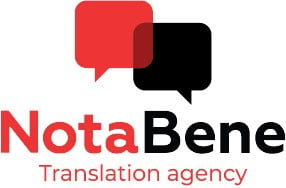Order translation from Greek or into Greek at NotaBene Agency in Poland!
NotaBene Translation Agency is an experienced supplier of translation from Greek into Polish and vice versa for any documents or texts.
What types of texts does NotaBene Translation Agency work with?
– Technical translation from Greek — we translate any texts in electronics, aviation and shipbuilding, agriculture, industry, oil and chemistry, etc. For this purpose, we pick translators who understand the specific nature of a given industry.
– IT translation from Greek for the localization of applications, games, software and websites.
– Medical translation from Greek — books, manuals, articles in specialized printed and online publications, clinical records, correspondence with medical institutions, transcriptions and translations of test results, instructions for medicines and many other types of texts. This kind of translation requires flawless knowledge of medical terminology and focus on detail to rule out ambiguity, because the result can affect the health or life of many people.
– Legal translation from Greek: statutes, registration deeds, articles of incorporation, contracts, powers of attorney, court records and many other similar documents.
– Financial translation from Greek: this type of translation includes the translation of balance sheets, tax returns, payment invoices, waybills, tender documents, etc.
– Literary or fiction translation from Greek of fiction, marketing and advertising materials. Unlike the previous types of translation, in this case there is more room for a translator’s creativity, because there is no need for “word for word” translation. The most important thing is that the translated material produces the same impact as the original, while an excellent translation may even make it better.
Please note that the translation mentioned is certified by an agency seal only. If you need sworn translation, kindly notify your manager in advance. Sworn translation is possible only for certain languages.
How to have a translation from Greek to English, Polish, Russian, Belarusian or Ukrainian?
First of all, you need to order it. To do so, send your source text and specify your requirements for the translation from Greek. A customer service specialist at the Nota Bene Translation Agency will prepare a ToR based on the specific features of the order. If the project involves more than one job, a unique glossary is created to ensure the consistency and proper use of terminology.
An entire team of several professionals normally makes the translation from Greek: a translator, proofreader, editor, quality controller, layout designer and manager who will be available during working hours. In order to rule out human errors, the translation agency uses modern services to check punctuation, idioms, numerical expressions, and formulas. The material is also reviewed by the chief editor.
Confidentiality of translated data is ensured by a special NDA, whenever a customer wishes to have one. Documents can be delivered to any country.
We very rarely apply additional fees for “urgency” or “specialized subjects”, so you can be sure that the price will not rise when the project is delivered. It is true that in rare cases, such as “we need to have it yesterday” instances, and when a customer is willing to pay a higher rate for the team to work outside normal working hours, at night or on weekends, the fee might be increased, but this is always negotiated with the customer in advance.
Interesting facts about the Greek language
The first thing that comes to mind when you think of Greek is its unusual but so recognizable alphabet. But of course, the interesting features of this language are not limited to that.
1. Greek belongs to the Indo-European languages, being the only one of the Greek group. It is an official language of the European Union and is spoken in Greece and Cyprus. Native speakers can also be found in many other countries around the world. There are about 15 million speakers of this language in the world.
2. It is one of the oldest written languages in the world. There are extant written monuments dating back to the 14th century BC. Greek alphabet consisting of 24 letters has become a basis for Latin, Cyrillic and other alphabets.
3. The Greek alphabet is the first alphabet known to us which used vowel letters. Other alphabets of that time had only consonants and used diacritical marks for vowels (this is still used for instance in Arabic and Hebrew).
4. The ancient Greeks wrote from left to right and from right to left at the same time. If the first line went from right to left, the line below it was written in the opposite direction. This way of writing is called boustrophedon. Later, the Greeks preferred to write only from left to right. And later other nations of Europe adopted it from them.
5. When ancient Greece was conquered by the Romans and became a province of the Roman Empire, the conquerors had a peculiar attitude towards it. For example, knowledge of Greek was considered essential for anyone who claimed to be educated
6. Today, Greek is divided into New Greek, Middle Greek (used during the Byzantine Empire) and Ancient Greek. The former is divided into two forms: dimotica and kafariovus. The generally accepted form, since 1976, is dimotica. Dimotica is a vernacular and a simpler version of the language, which has developed naturally, while Kafariovusa is a conservative form rich in archaisms and is considered the language of the aristocracy. The division into the two modern forms dates back to 1821, when the Hellenic Republic was founded and a linguistic reform was undertaken, which resulted in the emergence of the New Greek.
7. Many modern languages have just a huge number of borrowings from Greek. Thus, it is believed that there are at least 50,000 words in English with Greek roots. These are mainly words related to science, technology and medicine. There are also many similar words in Polish. For example, the word “polyglot” comes from Greek. By the way, modern Greek itself has a lot of borrowings from English.
8. The longest word in Greek consists of 172 letters and looks like “λοπαδοτεμμαχοσελαχογαλεοκρανιολειψανοδριμυποτριματοσιλφιοκεκεχυμενοκιχλεπικοσυφοφαττοπεριστεραλλιοκιγκλοπελειολαγῳοσιραιοβαφητρανοπτερύγων”. And here it is not only the word itself that is interesting, but also the history of its appearance. Its author is the famous ancient Greek comedy writer Aristophanes, also known as ‘the father of comedy’. He used the word in his comedy “Women in the People Assembly” in 392 BC. It refers to a dish made up of a number of ingredients, which are actually listed in the word.
9. In Greek, the question mark is replaced by a semicolon. This is due to the fact that historically the inverted question mark is used, when the full stop is on top (in Spanish it is placed at the beginning of the interrogative sentence). When the Greeks need a semicolon they use a decimal Sometimes a semicolon may be used instead of a colon.
10. The New Testament was written in Greek, which was widely spoken at the time. But the quality of translations from Hebrew and Aramaic into Greek was far from perfect. Because of this, the Gospels contain many difficult to understand passages, or even errors. For example, the famous statement of Christ, “It is easier for a camel to go through the eye of a needle than for a rich man to enter the kingdom of God. It is believed that there was a misprint, instead of “camel” it should have been “rope” – these words are spelled almost identically in Greek (“kamelos” and “kamilos” respectively).
P.S. Some words that came into Polish and other languages from Greek have changed their original meaning quite a lot. For example, the word “idiot” comes from the Greek “idiotis”. It was a way of describing the inhabitants of polis who did not want to take part in public life. It was not quite right behaviour according to the social norms of the time, although the word did not have the negative connotation it has today
We have been in business for over 20 years and during that time we have learned to work well. Trust us with your translation from Greek and get a great result at a reasonable price!








